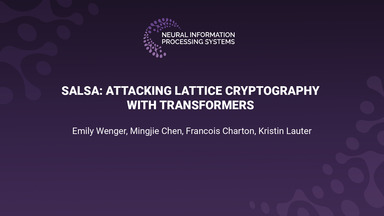A Connection between One-Step Regularization and Critic Regularization in Reinforcement Learning
Dec 2, 2022
Speakers
Benjamin Eysenbach
Sprecher:in · 0 Follower:innen
Matthieu Geist
Sprecher:in · 0 Follower:innen
Sergey Levine
Sprecher:in · 1 Follower:in
Ruslan Salakhutinov
Sprecher:in · 0 Follower:innen
About
As with any machine learning problem with limited data, effective offline RL algorithms require careful regularization to avoid overfitting. One-step methods perform regularization by doing just a single step of policy improvement, while critic regularization methods do many steps of policy improvement with a regularized objective. These methods appear distinct. One-step methods, such as advantage-weighted regression and conditional behavioral cloning, are simple and stable. Critic regularization is more challenging to implement correctly and typically requires more compute, but has appealing lower-bound guarantees. Empirically, prior work alternates between claiming better results with one-step RL and critic regularization. In this paper, we draw a close connection between these methods: applying a multi-step critic regularization method with a large regularization coefficient yields the same policy as one-step RL. Practical implementations violate our assumptions and critic regularization is typically applied with small regularization coefficients. Nonetheless, our experiments nevertheless show that our analysis makes accurate, testable predictions about practical offline RL methods (CQL and one-step RL) with commonly-used hyperparameters.As with any machine learning problem with limited data, effective offline RL algorithms require careful regularization to avoid overfitting. One-step methods perform regularization by doing just a single step of policy improvement, while critic regularization methods do many steps of policy improvement with a regularized objective. These methods appear distinct. One-step methods, such as advantage-weighted regression and conditional behavioral cloning, are simple and stable. Critic regularizatio…
Organizer
NeurIPS 2022
Konto · 961 Follower:innen
Like the format? Trust SlidesLive to capture your next event!
Professional recording and live streaming, delivered globally.
Sharing
Recommended Videos
Presentations on similar topic, category or speaker
SolarDK: A high-resolution urban solar panel image classification and localisation dataset
Später ansehen
Ewigspeicher-Fortschrittswert: 0 = 0.0%
Local Convolutions Cause an Implicit Bias towards High Frequency Adversarial Examples
Später ansehen
Ewigspeicher-Fortschrittswert: 0 = 0.0%
Target-based Surrogates for Stochastic Optimization
Später ansehen
Ewigspeicher-Fortschrittswert: 0 = 0.0%
A Brief Overview of AI Governance for Responsible Machine Learning Systems
Später ansehen
Navdeep Gill, …
Ewigspeicher-Fortschrittswert: 0 = 0.0%
SALSA: Attacking Lattice Cryptography with Transformers
Später ansehen
Emily Wenger, …
Ewigspeicher-Fortschrittswert: 0 = 0.0%
FlyView: a bio-inspired optical flow truth dataset for visual navigation using panoramic stereo vision
Später ansehen
Alix Leroy, …
Ewigspeicher-Fortschrittswert: 0 = 0.0%





